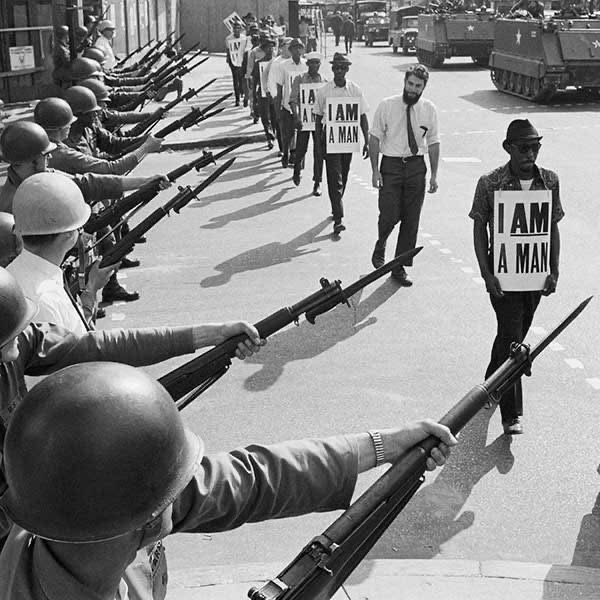WHAT HAPPENED TODAY IN LOWELL

On February 1, 1968, Echol Cole and Robert Walker were crushed to death by a malfunctioning garbage truck. The untimely death of these city sanitation workers led the Memphis sanitation workers to strike for safety protections on the job, for a living wage, for a union – and most of all, for dignity. Even if you never learned the story of the strike in school, you probably remember images of strikers and supporters holding signs saying “I AM A MAN” in the midst of the civil rights era.
This morning in Lowell, another horrific accident occurred, one that rhymes uncannily with the past – this time at the hands of a sanitation worker, whose wages and benefits aren’t all that much better than what they were 50 or 70 years ago. The worker certainly wasn’t to blame; it was dark out, and the victim was sleeping in an alleyway off Appleton Street when he was crushed to death. It would be easy to say, “this was just a tragedy and it could have happened to anyone.” But that would be a terrible mistake. The accident that happened this morning is very specifically of this time and of this place, just like the tragedy that befell Cole and Walker was the product of its own time and place: of a city that refused to negotiate with workers or provide safe equipment, of a workforce made desperate by generational poverty and racial injustice.
In Lowell, we have a city council that has declared war, not on poverty but on the poor, not on addiction but on the addicted, and not on homelessness but on those without homes. “It’s not our problem,” they tell us, “because other cities aren’t doing their part.” Or “because those people don’t want help.” Or “because what we have offered should be enough.” Or “because it’s the state’s problem.” Or because they are “zombies” who should be gotten rid of, as one councilor has written on social media. We should encourage them to go somewhere else; we should arrest them; we should put them in mental hospitals without their consent. As long as they aren’t here, in our city, where we have to see them and interact with them. For students of both the civil rights era and of the eugenics era that preceded it, the language is starkly, sickeningly familiar. It’s a short line between wanting someone to disappear and wanting them dead.
What Dr. King recognized, and our elected officials have not or will not recognize, is that the line between “those people” and the rest of us is vanishingly thin. In his “I’ve Been to the Mountaintop” speech, delivered in Memphis the night before his assassination, King declared that “the nation is sick.” A culture that could look the other way at the deaths of low-paid municipal workers, that could pretend not to see those struggling in their midst, needed to be woken up. This is what I AM A MAN meant: I am here, I am in front of you, I exist. You cannot get rid of me by pretending I don’t exist. And I’m not alone. There were just over a thousand sanitation workers – but thousands and thousands of supporters willing to stand by their side, rich and poor, of every age and race and faith.
“Let us develop a kind of dangerous unselfishness,” King said in that final speech. Dangerous because he called for changes not just to hearts and minds, but to policies and governments. His assassination occurred at the hands of those who recognized the true threat to power and the status quo he was calling for. This meant both refusing “compassion by proxy” and engaging with people ourselves, but also refusing to accept cruel and inhumane policies in our names.
When we in Lowell force people into alleyways because they live in fear of arrest, of being roughed up the police for the crime of sleeping, of being sectioned and hidden out of sight in mental hospitals or prisons, the result is this. When we offer one-size-fits all solutions, and refuse to listen to why those solutions don’t work for everyone, we risk this kind of tragedy which surely cannot be called an accident – and we put low-paid workers in the position of doing the city’s dirty work. A truly dangerous unselfishness can start in the city, today and right now, by refusing to allow our officials to dehumanize our neighbors in our name.